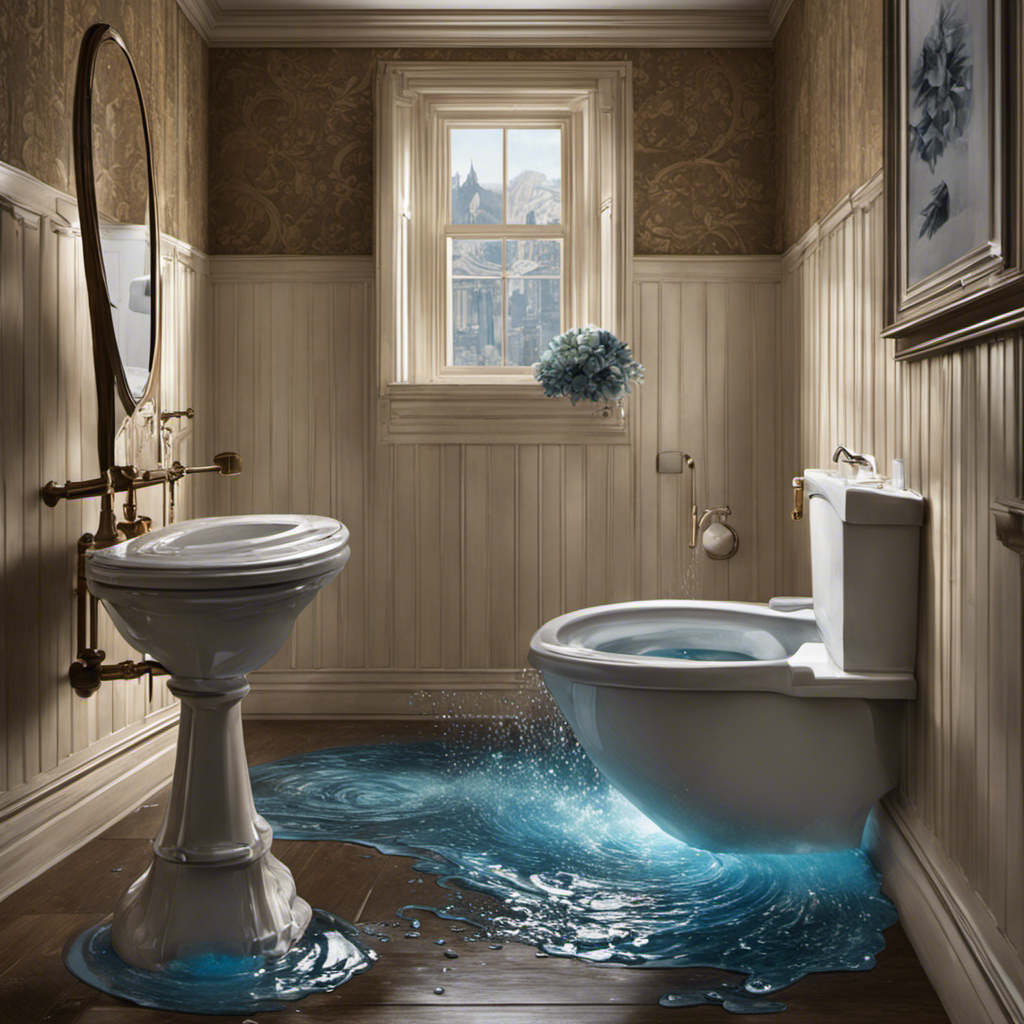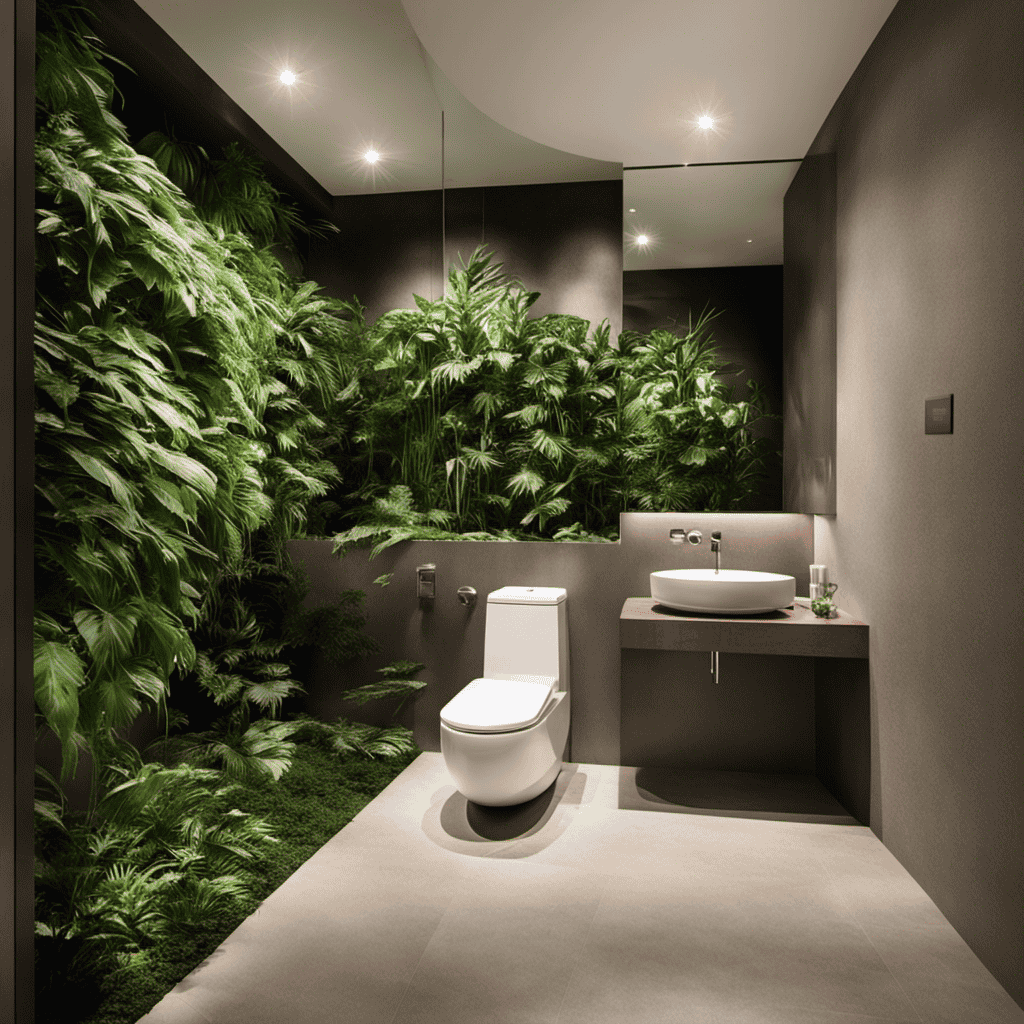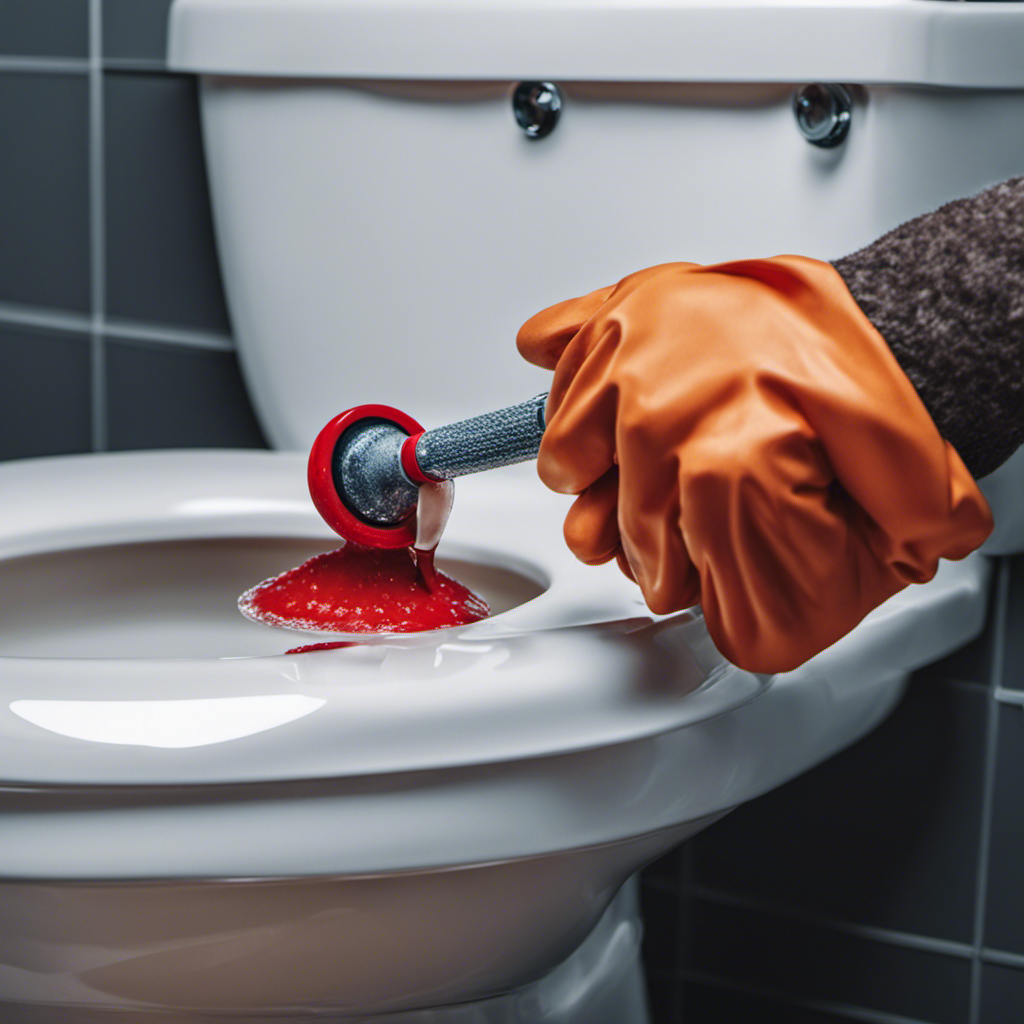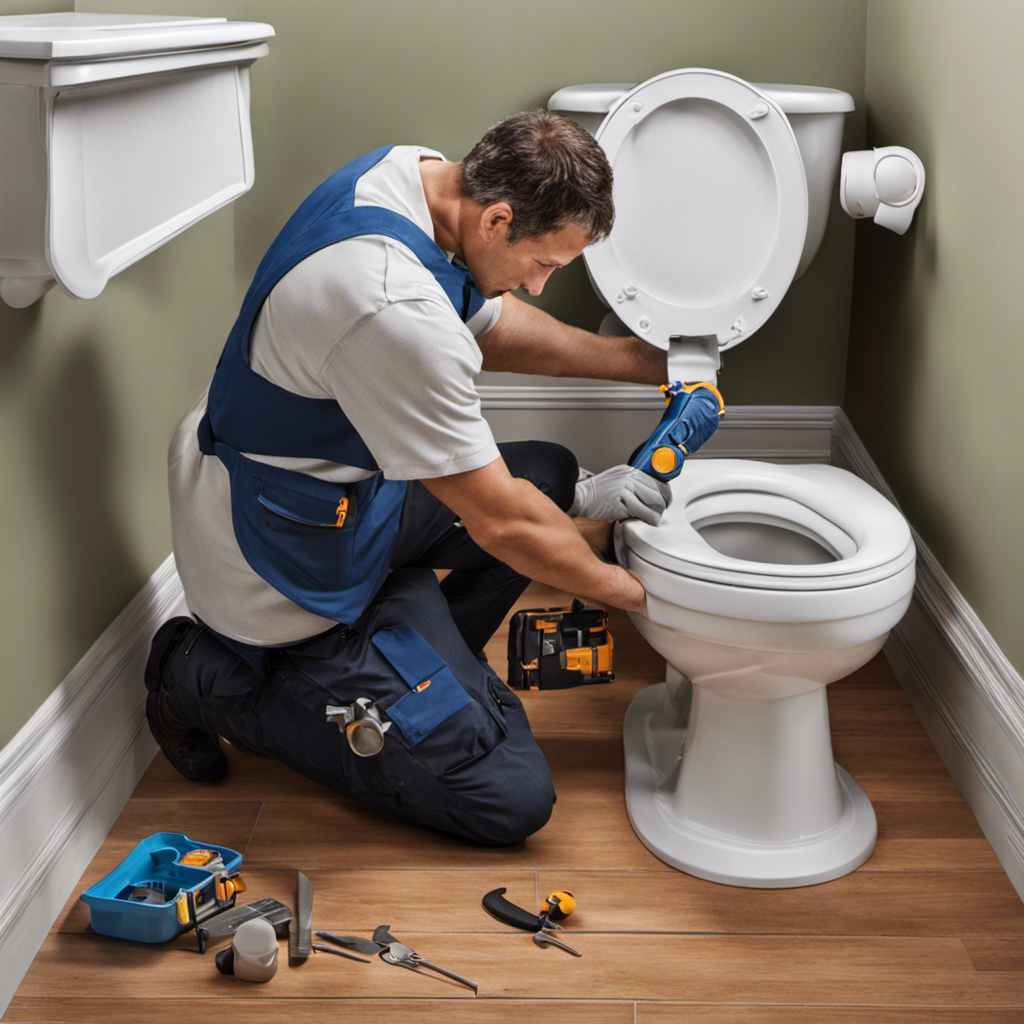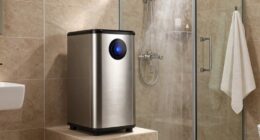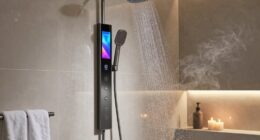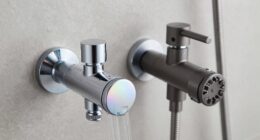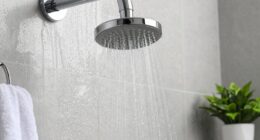Are you tired of being startled by the unsettling sound of your toilet gurgling while you’re taking a shower? Don’t worry, you’re not alone.
This common plumbing issue can be quite frustrating, but understanding the causes and finding effective solutions is key to restoring peace in your bathroom.
In this article, we’ll delve into the possible reasons behind toilet gurgling during showers, provide practical DIY fixes, and guide you on when it’s time to call in a professional plumber.
Get ready to bid farewell to those noisy interruptions!
Key Takeaways
- Clogged vent pipe and blocked drainage can cause toilet gurgling when showering.
- DIY fixes such as using a plunger or drain snake can help clear obstructions.
- Lack of proper toilet venting can be resolved by installing a vent pipe.
- Regular plumbing maintenance, including proper disposal of waste and avoiding non-flushable items, is essential to prevent toilet gurgling and other drainage problems.
Common Causes of Toilet Gurgling During Showers
When you shower, the most common cause of the toilet gurgling is a clogged vent pipe.
It is important to understand that the vent pipe plays a crucial role in your plumbing system. It allows air to enter the drain pipes, preventing air pressure buildup and ensuring smooth drainage.
If the vent pipe becomes clogged or blocked, it can lead to drainage issues and result in the toilet gurgling when you shower.
To resolve this problem, you can try using a plunger to clear any obstructions in the vent pipe. If that doesn’t work, it may be necessary to call a professional plumber for further plumbing troubleshooting.
They will have the necessary tools and expertise to identify and fix the issue, ensuring proper drainage and preventing toilet gurgling in the future.
Understanding the Plumbing System: How It Works
Understanding how the plumbing system works can help explain the gurgling sound that occurs while taking a shower. The plumbing system in your home is a complex network of pipes and fixtures that work together to carry water in and out of your house. When you turn on the shower, water flows through the pipes and drains away. However, if there is a problem with the plumbing system, such as a clog or a venting issue, the water may not flow smoothly, causing air bubbles to form and create the gurgling sound.
To prevent and troubleshoot plumbing issues like this, regular plumbing maintenance is essential. This includes checking for leaks, clearing any clogs, and ensuring proper ventilation. By understanding the basics of how your plumbing system works, you can better identify and address any problems that may arise.
Now, let’s explore the signs and symptoms of a drainage problem.
Signs and Symptoms of a Drainage Problem
If you’ve noticed water backing up in your sinks or slow draining sinks, it’s important to address these signs as they could indicate a drainage problem.
Water backing up in your sinks can be a sign of a clog or blockage in your plumbing system, causing the water to have difficulty flowing down the drain.
Slow draining sinks can also be a result of a clog or blockage, and it’s important to address this issue promptly to prevent further damage.
Additionally, an unpleasant odor coming from your drains can be a sign of a buildup of debris or stagnant water. This can lead to bacteria growth and potential health hazards.
Water Backing up
You may notice water backing up in your sink or bathtub when you flush the toilet. This can be a sign of a drainage problem that needs to be addressed. One possible cause of water backing up is a blockage in the sewer line. When you flush the toilet, it creates a surge of water that can put pressure on the sewer line. If there is a blockage, the water can’t flow freely and may back up into other fixtures in your home. Another common cause is a clogged shower drain. Hair, soap scum, and other debris can accumulate in the drain over time, causing water to back up when you shower. To prevent these issues, it’s important to maintain your plumbing system by regularly cleaning drains and addressing any blockages promptly.
Here is a table to help you understand common causes of water backing up:
| Cause | Symptoms | Solution |
|---|---|---|
| Blockage in sewer line | Water backing up in sinks | Call a plumber |
| and bathtubs | ||
| Clogged shower drain | Water backing up when | Remove hair and debris |
| showering | from the drain |
Slow Draining Sinks
One possible cause of slow draining sinks is a buildup of hair, soap scum, and other debris in the drain. Over time, these materials can accumulate and create a clog in the pipes, preventing water from flowing freely.
When this happens, you may notice that water takes longer to drain or that it doesn’t drain at all. If left untreated, clogged pipes can lead to more severe plumbing issues, such as water backups or leaks.
To resolve this problem, plumbing repairs may be necessary. A professional plumber can use specialized tools to remove the clog and restore proper drainage.
Unpleasant Odor
The unpleasant odor coming from your sink may be caused by stagnant water trapped in the clogged pipes. This can happen when debris, hair, or other materials accumulate and block the flow of water.
When water sits in the pipes for an extended period, it becomes a breeding ground for bacteria, which results in the foul smell. To eliminate the bacteria and get rid of the odor, you will need to address the underlying plumbing issue.
Plumbing repairs may include using a plunger or drain snake to remove the clog, or in more severe cases, calling a professional plumber to assess and fix the problem.
Regular maintenance, such as using drain cleaners and avoiding dumping grease or food particles down the sink, can also help prevent future clogs and odors.
DIY Fixes for Toilet Gurgling Issues
If your toilet is gurgling when you shower, a possible DIY fix is to check for clogs in the drain system. Toilet gurgling is often caused by a lack of proper toilet venting or clogged pipes. By identifying and addressing these issues, you can resolve the gurgling problem and restore normal functioning to your toilet. Here’s a simple table that outlines some DIY fixes for toilet gurgling issues:
| Possible Causes | DIY Fixes |
|---|---|
| Lack of proper toilet venting | Install a toilet vent pipe or extend the existing one |
| Clogged pipes | Use a plunger or a drain snake to remove the blockage |
When to Call a Professional Plumber
If you’re experiencing persistent issues with your plumbing, it may be time to call a professional plumber.
One common sign of a clogged drain is water backing up in sinks or showers. You may also notice slow draining or gurgling sounds coming from your drains. These signs indicate that there is a blockage in your plumbing system that needs to be addressed.
To prevent plumbing issues, it’s important to avoid flushing anything other than toilet paper down the toilet. Additionally, regular maintenance like cleaning your drains with a mixture of baking soda and vinegar can help prevent clogs.
Remember to also avoid pouring grease or oil down the drain, as they can solidify and cause blockages.
Preventive Maintenance Tips to Avoid Toilet Gurgling
If you want to avoid the annoying sound of toilet gurgling while taking a shower, there are a few preventative measures you can take. Troubleshooting toilet gurgling can be simple if you follow these tips.
Firstly, make sure that your drains are clear of any obstructions. Hair, soap scum, and debris can build up in the pipes, causing blockages and resulting in gurgling sounds. Regularly clean your drains using a drain cleaner or a mixture of vinegar and baking soda.
Additionally, consider installing a vent stack on your plumbing system. A vent stack helps to equalize pressure and prevents gurgling by allowing air to flow freely through the pipes.
Lastly, avoid flushing large amounts of toilet paper or other items down the toilet. This can cause clogs and result in gurgling sounds.
Conclusion
In conclusion, when your toilet gurgles while you’re showering, it’s important to address the issue promptly.
By understanding the common causes and signs of a drainage problem, you can take necessary steps to fix the problem yourself.
However, if DIY fixes don’t work, don’t hesitate to call a professional plumber who has the expertise to resolve the issue.
Taking preventive maintenance measures, such as regular cleaning and inspections, can help you avoid future toilet gurgling mishaps.
Remember, keeping your plumbing system in top shape is crucial for a smooth and hassle-free shower experience – a must for any bathroom aficionado.
